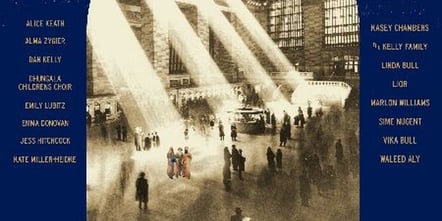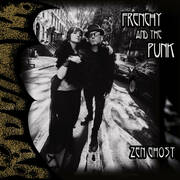New York, NY (Top40 Charts) Children would argue that receiving more for the holidays is always better. In keeping with that childhood principle, celebrated Australian musician Paul
Kelly is gifting fans with a brand-new recording, "MAYBE THIS CHRISTMAS" just in time for seasonal gift giving.
"'Maybe This Christmas' is written by Ron Sexsmith from Canada," says
Kelly about the track that will be officially available on December 2, 2022. "He released it in 2002 and the song has long been a favourite of mine. I love the lines about forgiveness in the second verse."
As an added bonus to the digital version only of his recently released PAUL KELLY'S CHRISTMAS TRAIN (Cooking Vinyl/Gawd Aggie) which was also released on vinyl and CD, his new interpretation retains the festiveness that the original carried and augments it with gorgeous harmonies from Melbourne musician and one half of celebrated Australian duo Sweet Jean, Alice Keath.
"I thought it would be good to do as a duet so I asked Alice to join me and the band in Soundpark studios last month," he says with a smile. "She always finds interesting harmonies."
The vinyl and CD versions of Paul Kelly's Christmas
Train pairs ten seasonal standards with an addition dozen tracks for an is an extraordinary 22-song double album that travels across the centuries, from a Latin hymn to well-known carols, from a traditional Irish folk ballad to songs with an unmistakable local flavor, and a sparkling new version of one of the greatest Australian Christmas songs of them all, Kelly's own "How to Make Gravy" on EMI Cooking Vinyl / Gawd Aggie.
"I've always been interested in Christmas songs and the variety of them,"
Kelly says. "There is a double-edged sword to Christmas music because every year, it is everywhere, pumped to you in supermarkets and malls. There is a lot of schlock attached but, on the other hand, there are so many great Christmas songs and so much to explore. I've chosen songs I love which led me often to wander off the well-worn path, then chosen singers I thought best suited to them."
The sacred and the secular, the ancient and modern, are all carefully woven into a collection destined to become a part of Christmases around the globe for many years to come. It is delivered by
Kelly and his band with a big cast of Christmas helpers including vocalists Vika and
Linda Bull,
Marlon Williams, Kasey
Chambers and Emma Donovan, along with contributions from the
Kelly clan: nephew and bandmate Dan, siblings Mary-Jo and Tony, and Paul's daughters Maddy and Memphis.
Part of the joy in Paul Kelly's Christmas
Train comes from discovering fresh ways to treat the best-known songs, from the Hawaiian guitar and ukuleles of "Silent Night," with a verse in the original German sung by Alice Keath, to an astonishing performance by
Marlon Williams singing "Tapu Te Pō" (O Holy Night) in the Māori language.
The story of Jesus and Mary has strong associations with Judaism and Islam (the Qu'ran has a chapter devoted to the story); here on Christmas
Train singer-songwriter Lior joins Paul, Alice, and Emily Lubitz for an a cappella reading of the Hebrew prayer of peace, "Shalom Aleichem," and Waleed Aly recites the vivid poetry of Surah Maryam.
Kelly and his band bring a '60s-fired energy to "Christmas," an Australian song of longing for home by brothers Chris and Wes Harrington, and
Linda Bull tears up the place on "Christmas (Baby, Please Come Home)," a song originally recorded by
Darlene Love on Phil Spector's A Christmas Gift for You.
"I hadn't even thought about putting "How To Make Gravy" (his universally-beloved holiday song) on the record but when I talked to friends, they all said, 'Really? You're not? Just do another version.' Our live version has evolved from the original recording (initially released in 1994), so we said, 'Let's lay it down and see what we think.' We have been doing it forever, so it was recorded in one or two takes. It has been 25 years since the song first came out so that's another reason to have it here. Note that
Peter Luscombe played on the original, too."
The BBC describes Gravy Day, December 21st, as a date "deemed increasingly worth celebrating." "Gravy Day," "the 21st of December," and "Paul Kelly" have become trending terms on Twitter, with many posts playing off How to Make Gravy's narrative. The song's popularity has inspired media outlets to investigate the protagonist's possible back story and the key question in the song: "Who's gonna make the gravy?" Several years ago,
Kelly began to acknowledge the trend by hosting Gravy Day concerts.























